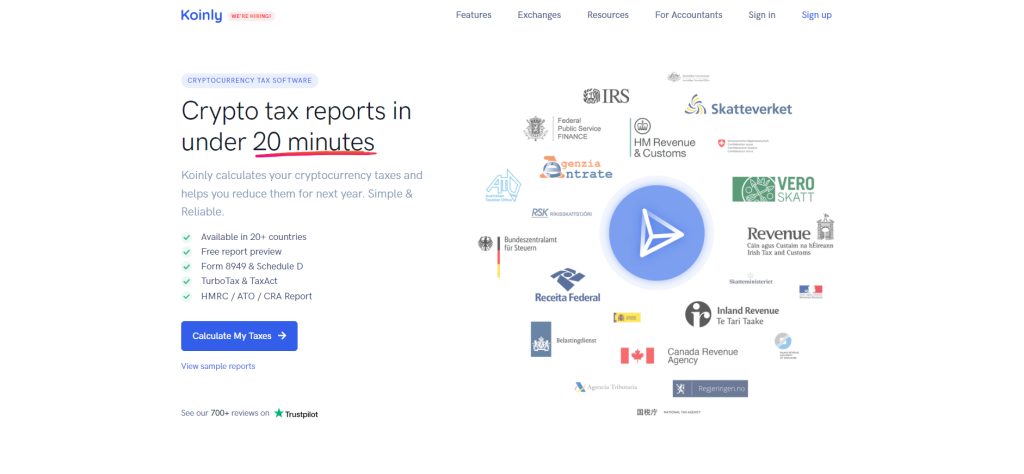
What you'll learn 👉
Intro
If you’re like most people, you probably trade crypto because it’s fun, exciting, and most importantly, potentially life-changing. But what happens if you lose money on your trades? Can you deduct those losses against your taxable income? If you answered “yes,” congratulations – you’ve just learned something about crypto taxes.
In this article, we will explain to you how to report crypto losses on your taxes in different situations.
Can you write off crypto losses on taxes?
Crypto is considered property under the Internal Revenue Code, meaning that you must report capital gains and losses on your federal tax return. You’ll want to file Form 8949 if you sell crypto for profit. Losses incurred while buying or holding crypto qualify as short-term or long-term capital loss deductions. These losses can reduce your taxable income, which could lower your tax bill.
Losses over $3000 can be carried forward to future tax returns. For example, if you lost $4000 on a single transaction, you’d be able to carry forward that loss to next year’s filing. In addition, if you experience losses in multiple transactions, you can combine them and claim one deduction per year.
How do crypto tax calculators help with tax loss reporting?
Profits, losses, income, and tax responsibilities can all be determined with the use of a crypto tax calculator. The final figures are based on the data and information on your investment activity that crypto tax calculators pull from your crypto wallets and exchanges.
In the text below, you can find the top 3 crypto tax calculators that will help you with your crypto tax loss reporting:
Koinly
You can keep track of all your transactions and create tax records that adhere to all applicable rules using the online crypto tax platform Koinly. By enabling you to merge your wallets and keep track of activities like trading, mining, staking, lending, and airdrops, Koinly makes it easier to keep track of all the specifics of recording transactions.

You can manage wallet transfers, monitor market prices, import transactions automatically, compute your crypto gains and losses, and generate tax returns with Koinly.
The portal is accessible from more than 20 different nations and provides a comprehensive crypto tax reporting service. Additionally, it connects to 75 wallets, 350 exchanges, and over 6,000 blockchains. Although the platform’s basic plan is free (you can do up to 10k transactions but can’t download them until you pay), annual subscriptions range in price from $49 to $279.
Zenledger
ZenLedger is currently one of the most well-liked options for reporting crypto tax. “Simplify DeFi, NFT, and crypto taxation for investors and tax experts” is the claimed objective. Utilizing this service can help you with your tax planning because it will give you a thorough record of all of your crypto transactions and outcomes in one location.

This program comes in handy if you wish to claim tax losses or have capital gains from crypto trading because they have a separate tool just for tax loss reporting.
It integrates more than 400 crypto exchanges, 40 blockchains, and more than 30 DeFi protocols. You may add your holdings and transaction history from other exchanges, wallets, and crypto projects to your ZenLedger dashboard.
It has 5 types of annual subscription plans. The free plan provides up to 25 transactions for $0. The starter plan offers up to 100 transactions for $49.
Then, the most popular plan for customers is the premium which provides up to 5000 transactions for $149.
Next, the executive plan provides up to 15 000 transactions for $399.
Finally, the most expensive and the best plan, platinum, offers unlimited transactions for $999.
Coinledger
Another great tool for submitting taxes for cryptocurrency, decentralized finance (DeFi), and nonfungible tokens (NFT) transactions is CoinLedger.

It was specifically designed for the US market. With the addition of Australian users over time, this site is now accessible to anyone who resides in a nation that accepts FIFO, HIFO, or LIFO reporting. Four simple actions are needed to prepare your crypto taxes:
- Bring in all of your crypto transactions from each exchange, wallet, or DeFi/NFT world each year.
- Add crypto earnings from mining, staking, gifts, or airdrops.
- You can create your tax report after importing your transaction history and reviewing all of your data.
- You can submit your crypto taxes on your own or have your accountant do it.
CoinLedger has 4 types of pricing plans per tax season. First is Hobbyist, which costs $49 and provides 100 transactions. Another is Day Trader, which costs $99 for 1500 transactions. Then there is the High Volume plan, which costs $199 and provides 5000 transactions. Finally, the Unlimited plan has unlimited transactions for $299.
Calculating crypto losses
To calculate your crypto losses, follow the steps in the text below:
- Determine the net total of your long-term gains and losses, including those on non-crypto assets.
- Determine the net total of your short-term gains and losses, including those on non-crypto assets.
- Calculate your total capital gains or losses by adding the long-term and short-term gains/losses.
Income tax deduction
It is possible to deduct up to $3,000 in capital losses from your earnings if they occur across all of your assets. If your portfolio as a whole saw capital gains, you cannot deduct any of your losses. In spite of this, you can still utilize your losses to offset gains from other investments.
Offsetting capital gains
Your virtual currency losses can be used to offset other capital gains, either in the current tax year or in future tax years, if carried forward, regardless of how your other assets have performed as a whole.
Can I get a crypto scam tax deduction?
If you’ve been the victim of a hack or a sham, you may be wondering if crypto scams qualify as deductible losses on your taxes. In the event that you lose control of your crypto, there is no simple way to claim the loss.
New guidance from the IRS makes it clear that only disaster-related losses can be deducted using form 4868. Even though the IRS explicitly forbids its use in this way, many people still file it to deduct the cost of stolen property. Losses from hacking, ransomware, or a failed ICO, for instance, are not deductible by taxpayers, according to the IRS.
Can you claim a capital loss if you haven’t sold your crypto?
If you want to deduct a loss against capital gains, you must first realize that loss. To fully experience a loss, you must first dispose of your crypto. For example:
- Crypto-to-fiat currency trading or selling
- Crypto-to-crypto trading
- Using crypto to pay for a product or service
You won’t be able to write off any losses if you’re just keeping your cryptos in storage. Only after a taxable event takes place will you be able to declare your losses.
What if I earned crypto income and the price went down?
The value of any crypto received as a result of mining, staking, or airdrops are considered personal income and taxed accordingly, even if the value of your crypto falls in the market.
You will be treated as having suffered an unrealized loss on any crypto gains you choose to hold on to. However, if you decide to sell, you can deduct the amount by which the value of your crypto income has decreased since you first got it as a capital loss.
Do you have to report crypto losses to the IRS?
The IRS must be informed of any crypto losses. Since the IRS treats cryptos as property, any gains or losses incurred as a result of trading or selling crypto must be reported.
Your capital gains tax can be reduced if you have crypto losses that you use to offset gains. Another reason to declare your crypto losses is that you can deduct them against your regular income.

Can I write off lost or stolen cryptocurrency?
There is always the risk that an investor will lose all or part of their crypto investment due to things like a hack or a lost wallet key. Since the passage of the Tax Cuts and Jobs Act of 2017, losses from theft and other casualties are no longer deductible.
Can I sell cryptocurrency at a loss and buy it back?
Some crypto investors choose to sell their holdings at a loss in order to take advantage of the tax benefits associated with reporting capital losses.
According to the rule, if security is purchased within 30 days before or after a sale, the investor is not eligible to claim a capital loss. Crypto investors are exempt from this law, thus, they can liquidate their holdings, take a capital loss, and reinvest the proceeds.
Can I report NFT losses on my taxes?
If you purchase NFT and its value drops after you buy it, the difference between its fair market value when you bought it and its fair market value when you sold it can be deducted as a capital loss.
How to report tax loss on LP impermanent loss?
An opportunity cost is a better way to define a temporary loss. Impermanent loss happens when you lend money to a certain pool and the value of your assets in the pool changes. The loss increases with a higher price change. Only if you remove your money from the liquidity pool does your loss turn into an irreversible loss.
Capital Gains Tax must be paid even if you sell an asset at a loss compared to what you could have made if you had stayed onto it. Include the gain in your net capital gain on Schedule D and file Form 8949 to report the sale.






